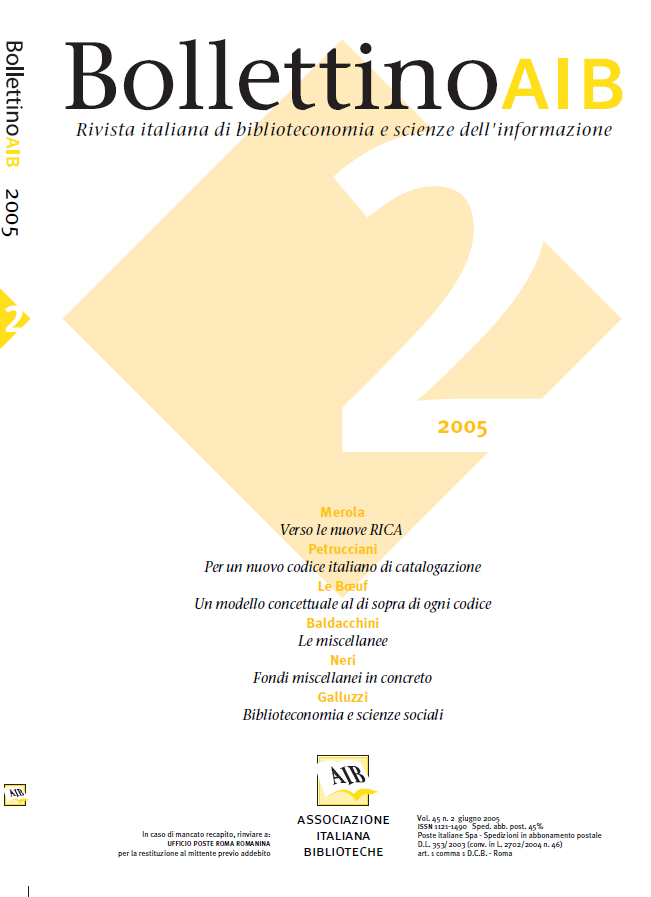Towards the new RICA
Main Article Content
Abstract
The RICA Commission, set up by the General Management for the book patrimony of the Ministry for Cultural Heritage and Activities, is born from a need to analytically re-examine the text of the RICA. This was conceived by its writers as an open code "that would act as the structure for any subsequent integrations and extensions".
Initially the Commission wished to re-examine in depth the text of the RICA code, in order to highlight the individual points for which it was necessary to programme an intervention. A complex job was therefore undertaken of analysis of problems opened, of rather unclear aspects, of observations collected on various occasions, of questions linked to the terminology and of comparison with the evolution that has taken place within the sphere of international regulations and in some other national codes.
The contribution of experts in the subject and of some writers of the code - especially of Luigi Crocetti, Diego Maltese and Carlo Revelli – assisted in preparing a group of "amendments", a document that acts as the basis for further investigations inasmuch as it systemizes the points that were examined and the relative observations.
The article presents the activity of the Commission, the reasons for which work on the revision of the code is being done, the initiatives of cooperation with Italian and foreign experts, the moments of public verification and of presentation of the work carried out.
Links with the evolution of the international standards and with the new models such as FRBR are examined and the participation in the current debate on the new international cataloguing principles is illustrated.
A final section is devoted to presenting the hypotheses and objectives of the current work: from the draft of the general structure of the new RICA, to attention to the specific aspects of the archives of authority, of cataloguing levels, of different materials and of terminological updating.
Further objectives are portability to other sectors of cultural heritage, for which controls with experts of the archive and musical world have been initiated, attention to users, and finally the methodology of diffusion of the documents, aimed at a crosscheck with librarians.
Initially the Commission wished to re-examine in depth the text of the RICA code, in order to highlight the individual points for which it was necessary to programme an intervention. A complex job was therefore undertaken of analysis of problems opened, of rather unclear aspects, of observations collected on various occasions, of questions linked to the terminology and of comparison with the evolution that has taken place within the sphere of international regulations and in some other national codes.
The contribution of experts in the subject and of some writers of the code - especially of Luigi Crocetti, Diego Maltese and Carlo Revelli – assisted in preparing a group of "amendments", a document that acts as the basis for further investigations inasmuch as it systemizes the points that were examined and the relative observations.
The article presents the activity of the Commission, the reasons for which work on the revision of the code is being done, the initiatives of cooperation with Italian and foreign experts, the moments of public verification and of presentation of the work carried out.
Links with the evolution of the international standards and with the new models such as FRBR are examined and the participation in the current debate on the new international cataloguing principles is illustrated.
A final section is devoted to presenting the hypotheses and objectives of the current work: from the draft of the general structure of the new RICA, to attention to the specific aspects of the archives of authority, of cataloguing levels, of different materials and of terminological updating.
Further objectives are portability to other sectors of cultural heritage, for which controls with experts of the archive and musical world have been initiated, attention to users, and finally the methodology of diffusion of the documents, aimed at a crosscheck with librarians.
Article Details
Section
Articles

This work is licensed under a Creative Commons Attribution-ShareAlike 4.0 International License.
